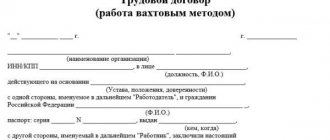An entrepreneur or organization has the right to hire hired specialists to conduct its activities. Most employees are involved as part of an employment relationship.
In simple words, an employment contract or agreement is concluded between the employer and the employee, which specifies all the significant terms of cooperation. When preparing a document of this category, the parties are required to be guided by the norms of the Labor Code of the Russian Federation.
However, this is not the only option for a working relationship. The employer has the right to involve citizens in performing work or providing services within the framework of civil norms. So, a different type of agreement is concluded between the parties, namely a template or sample employment contract for hiring an employee. Such a document must comply with the norms of the Civil Code of Russia.
Significant differences
Depending on the category of the agreement, the obligations and rights of the parties are determined. The content of the documents has significant differences:
Personal activities of a specialist.
Articles on the topic (click to view)
- What to do if the employer does not give the employment contract
- What is the difference between a collective agreement and an employment contract?
- Apprenticeship contract with an enterprise employee: sample 2021
- Terms of remuneration in an employment contract: sample 2021
- Go on maternity leave from the labor exchange
- Notice of extension of a fixed-term employment contract: sample 2021
- Notice of termination of a fixed-term employment contract: sample 2021
A specific result of work (service provided, work performed).
The employee is subordinate to the employer or his representatives.
Timely and systematic payment of wages, at least twice a month.
Remuneration for labor upon completion of work, an advance may be provided.
Taxes, fees and charges
Calculated and paid to the budget monthly.
Accrued and transferred to the budget upon accrual of remuneration.
Indefinite, but can be concluded for a specific period of time, with the right to extend.
Guaranteed at the legislative level.
For example, a person working under an employment agreement has the right to claim:
- regular paid leave of at least 28 calendar days for a fully worked year;
- reimbursement of employee expenses associated with business trips;
- payment for medical commissions, examinations and examinations (for certain categories of positions);
- paid advanced training courses and other types of education, training and retraining of personnel;
- guarantees upon termination of a working relationship, such as severance pay, vacation compensation, etc.
Not guaranteed, but may be included in the terms of the agreement.
Let us remind you that for an incorrectly drawn up document, the employer faces serious problems with the State Tax Inspectorate. So, for example, if the employment contract specifies conditions that are characteristic only of an employment agreement, then inspectors can re-qualify the contract. In addition to fines, the employer will have to ensure that the employee fulfills all social guarantees and payments. For example, pay for annual leave, add additional contributions, and also pay compensation for delayed salaries.
This is important to know: Rights and obligations of the employer under the employment contract
Under what conditions is an employment contract drawn up without formal registration?
What is a temporary employment contract without official registration? This is a type of employment relationship between an employee and an employer, the term of which has a clearly defined expiration date. Moreover, the contract may be completed upon the arrival of a certain date, or it may be terminated when the employee completes the amount of work assigned to him.
With such employment, no entry is made in the employee’s work book, a personnel card is not created for him, and other documents are not needed if the employee is hired as a full-time employee. Therefore, this type of work is called “without official registration.” But this is only one point in which the relationship between employee and employer differs. Otherwise, all guarantees for such an employee remain as with a regular employment arrangement.
For HR officers, the best option would be to indicate in the contract that the moment it ends will be when the employee performs a certain type of work. In this case, the employer does not need the services of the employee as soon as he completes the area of work entrusted to him. For example, he will make repairs to the premises.
In a situation where the contract states that it is valid until a certain date, the procedure for dismissing such an employee is different. The HR department must notify him three days before the date specified in the contract that his contract is ending. Also, if, before the completion of the contract, the employee did not have time or was unable for some reason to complete the amount of work entrusted to him, the HR department needs to sign an additional agreement with such employee to extend the contract.
But we must not forget that a temporary employee can be fired before the end of the contract with him. This can be either at the initiative of the employer or at the employee’s own request.
A temporary employment contract without official registration can be concluded with any employee, if there are legal grounds for this.
By whom and when can a temporary employment contract be drawn up?
There are various situations when it is not possible to conclude an open-ended employment contract with an employee. For example, when hiring seasonal employees, or when registering an employee on maternity leave. Agree, given such factors, concluding an open-ended employment contract with an employee is simply impractical.
Also, a temporary contract can be drawn up with the following categories of persons: trainees, persons in alternative service, trainees, persons forced to engage in forced labor, foreign citizens, as well as deputies (during the agreed period for which they were elected).
You can also find out more about all the various nuances associated with temporary employment in Article 58 and Article 59 of the Labor Code of the Russian Federation.
When can you conclude a temporary employment contract with an employee without official employment:
- The basis for concluding a VTD will be in the event of a temporary absence of the main employee from his workplace.
- In the case when an employee must perform a certain amount of work: temporary and seasonal work.
- Performing work that goes beyond the employer’s usual activities and is one-time in nature.
- The basis for concluding a VTD will also be the period of internship or temporary training.
- Temporary increase in production work that is seasonal in nature.
- Referral of an employee to temporary work by the employment center.
- When sending an employee to work abroad.
- If a person is elected to an elective position.
In these cases, which are listed below, the employer has the right, according to Art. 59, Part 1 of the Labor Code of Russia to hire an employee temporarily without his consent.
There are also situations that require mutual agreement with the employee in order to accept him for temporary work. They are regulated in Article 59, Part 2 of the Labor Code of Russia.
- If the employer is a small business entity, this is also a possible basis for concluding a temporary contract.
- An employee who gets a job at retirement age.
- If an employee has medical contraindications, work for a long time.
- The employee is a part-time worker.
- Employees for management positions: director, chief accountant, deputy director.
- If the position for which the employee is applying involves admission on a competitive basis.
- With students who are studying full-time (full-time) education.
- Also, a temporary employment contract can be concluded with employees who are engaged in creative professions and when the execution of work requires moving to remote regions of the North.
If there is no basis for concluding a temporary employment contract without official employment in Article 59, paragraphs 1 and 2, the employer does not have the right to draw up a temporary employment contract with the employee, and also not to formalize it.
Differences between a temporary employment contract and an employment contract
Although, at first glance, there are many similarities between a regular employment contract and a temporary one, they are also quite different. Let's look at the main differences between these types of contractual agreements.
- When it comes to a regular employment contract, the parties to it are called “Employee” and “Employer”. When we are talking about a temporary employment contract without official employment, the parties to it are called “Customer” and “Contractor”. Also in legal practice, such agreements are called civil agreements.
- In the employment contract, the employer undertakes to comply with all norms of civil law. In the case when an employee is registered temporarily without official employment, the customer may not comply with the norms of the labor code in terms of, for example, payment of vacation or sick leave.
- An employee who works at an enterprise under a temporary contract without official employment is not required to obey the internal regulations of the enterprise.
- Despite the fact that the employer pays taxes for an employee under a temporary contract, the insurance period for such an employee is not counted.
- Under an employment contract, an employee can work indefinitely (up to 5 years), in accordance with the norms of the Labor Code of Russia. As for a temporary contract, it usually ends immediately after the contractor has completed the amount of work entrusted to him.
- A temporary contract usually specifies clearly established wages for the entrusted amount of work. In the case of a regular employment contract, remuneration is stated as a fixed amount with possible bonuses, as well as allowances for a high level of work done.
Document structure
Document preparation is an important point. Please ensure that the sample employee employment agreement contains the following details:
- The name of the document, the date of its signing and the place of conclusion.
- Names of the parties. Note that it is impossible to call the parties “employer” or “employee” - these are terms of labor relations, but not civil ones.
- Subject of the agreement. Be specific about what the mercenary must do. For example, repair the plumbing system or install suspended ceilings in the office. Also clearly indicate the location of the work and the order in which it will be performed. If there are requirements for a service or work, then write them down in detail as well.
- Reward for work. Write down how much the mercenary will receive. It is permissible to indicate an advance. Also write down all types of taxes, fees and contributions that will be withheld and accrued when paying remuneration. Mandatory fiscal payments are recognized as: personal income tax and insurance contributions for compulsory health insurance and compulsory medical insurance, however, the list can be expanded by agreement.
- Validity. Designate a specific period of time during which the mercenary must complete the work or provide the service. If you omit this clause or specify vague wording, the document will be reclassified as an open-ended employment contract.
- Rights, obligations and responsibilities of the parties. List all relevant terms of interaction. It is permissible to prescribe the procedure for resolving disputes. However, this is not necessary.
- Addresses, details and signatures of the parties. Pay special attention to filling out the banking or payment details of the parties. Errors in these details will cause additional problems.
Once completed, check the document again. Eliminate all formulations characteristic of the vehicle. For example, remove all instructions: on compliance with internal regulations, on staff positions, on the performance of various functions.
Employer liability and punishment
Officials will face a fine of up to 20 thousand rubles (for each “unofficial” employee), and legal entities will face a fine of up to 100 thousand rubles with the obligation to compensate the employee for his entire period of work without registration. The fact of non-conclusion of an employment contract can be established not only by the court, but also by the labor inspector.
The tax office will also get involved and calculate taxes, fines and penalties, and if the amount exceeds 1,500,000 rubles, then contact law enforcement agencies to initiate a criminal case.
If an employer delays part of the salary for more than 3 (three) months or the full salary for more than 2 months, he faces criminal liability and, as a result, imprisonment, the term of which in especially serious cases reaches 5 (five) years.
The tax office will assess additional taxes (an example from judicial practice)
The judges noted that according to the provisions of Article 226 of the Tax Code of the Russian Federation, individual entrepreneurs from whom or as a result of relations with whom the taxpayer received income are required to calculate, withhold from the taxpayer and pay the amount of personal income tax to the budget. Clause 6 of Article 226 of the Tax Code of the Russian Federation stipulates that tax agents are required to transfer the amounts of calculated and withheld personal income tax no later than the day of transfer of income from the tax agents’ bank accounts to the taxpayer’s accounts or, on his behalf, to the accounts of third parties in banks (Court of the North Caucasus District, resolution dated December 5, 2011 in case No. A53-3905/2011).
In addition, the judges indicated that since the individual entrepreneur did not withhold and transfer the amount of personal income tax to the budget, the Federal Tax Service has the right to hold him accountable under Article 123 of the Tax Code of the Russian Federation in the form of a fine, since liability arises for the tax agent’s failure to fulfill the obligation to withhold and transfer taxes. The arbitrators also allowed the tax authorities to charge penalties, since Article 226 of the Tax Code of the Russian Federation places the obligation to pay personal income tax to the budget on tax agents, and penalties are a way to ensure the fulfillment of obligations to pay this tax.
Why conclude
Any working relationship must be documented. Having a written agreement will protect the parties from violation of their rights and guarantees. A tenancy agreement is no exception.
Pros for the employer:
- A guarantee that the work or service will be completed on time.
- Significant tax savings.
- There is no need to provide social guarantees.
- No need to set up a workplace.
- There is no need to follow internal regulations.
- Lack of leadership and superiors (the parties have equal rights).
- Possibility to involve third parties in execution.
- Possibility to combine work with main job.
As a result, the pros are for one side, the cons for the other. However, the document must exist in any case.
An individual hires performers
In this case, it is mandatory to conclude an employment contract for each such employee. This document is the main one for this type of hiring. You do not need a work book. The owner is responsible for paying taxes and submitting reports.
The employer is not required to keep books, since there is no expectation of making a profit. There is also no need to get a seal or open any bank accounts. Such employment contracts can be open-ended or for a specific period.
Conclusion
Working without a work book is possible in the cases described above. If this is done legally, then the employee has all the rights guaranteed by law. When hiring illegally without registration, both parties face risks. At the same time, employers risk receiving large fines and problems with the tax authorities, and employees are deprived of many rights provided for by the Labor Code of the Russian Federation. Therefore, it is advisable to avoid such activities.
Related posts:
- What is a work book in simple words and why is it needed?
- An individual entrepreneur is an individual or...
- Flexible schedule - full description, pros and cons
- Why you can be fired from your job - an overview of the reasons and types...
- Compensation for unused vacation - calculation details
- Vacation followed by dismissal - how to calculate and process
- Dismissal due to downsizing at work - what should...
- Counterparty - who are they and why are they needed?
Employment contract with an individual
Organizations and entrepreneurs specializing in the production of goods, provision of services to the population or legal entities, often feel the need to supplement their staff with employees hired to perform a specific type of work, or for the short-term performance of certain duties.
This is important to know: Payments upon termination of an employment contract
When hiring such workers, an employment contract must be concluded with them, regulating the relationship between the employer and the employee. As a type of agreement between the parties, the rental agreement has some features.
What are they, and how does an employment contract with an individual differ from a standard employment contract?
Parties details
Since we are talking about an individual employer, the standard sample employment contract between an individual entrepreneur and an employee must include his full data:
- FULL NAME.;
- information about the identity document;
- TIN;
- information about registration as an individual entrepreneur (from the entry sheet of the Unified State Register of Individual Entrepreneurs from 2021);
- location address.
If the contract is not concluded by the entrepreneur himself, but by an employee hired for this purpose or an otherwise authorized person, his data is also indicated in the document.
Tenancy agreement: legal concept
An employee employment agreement is a civil contract, which is considered by law as one of the types of agreement between an individual and an employer. Under the terms of such an agreement, the employer hires an employee to temporarily or one-time perform any work, services, or duties.
Expert opinion
Novikov Oleg Tarasovich
Legal consultant with 7 years of experience. Specializes in criminal law. Member of the Bar Association.
A tenancy agreement signed by the parties is only valid if it includes the essential terms of the agreement. It is in many ways similar to a standard employment contract, but has a number of differences from it, namely:
- the object of the contract can only be the final result of the work or the service provided, and not the systematic performance of labor duties;
- the contract is strictly limited by the terms specified in the contract and cannot be extended or renegotiated;
- payment under the contract is a remuneration and not a fixed set salary;
- this type of contract does not provide for the provision of benefits and social guarantees for the employee - payment of sick leave, vacations, etc.;
- The relationship of the parties within the framework of a rental agreement with an individual is regulated by the norms of not only Labor, but also Civil legislation.
Works or services for which it is permissible to conclude a contract for hiring an employee may include:
- one-time or specific work on landscaping;
- carrying out advertising campaigns;
- organization of public events related to the activities of the enterprise (symposiums, festive meetings, trainings for company employees, etc.);
- transportation of enterprise personnel;
- renovation of office and production premises, etc.
There is no unified form of such an agreement. This gives the employer the right to independently develop a form in which an employment contract with an individual will be drawn up; the sample document must contain all the basic sections - installation data and responsibilities of the parties, the subject of the agreement and the procedure for performing work or services, issues of payment, responsibilities of the parties, conditions for termination of the contract.
The contract is signed in two copies, no later than three calendar days from the moment when the person hired to perform the work began the relevant work.
General provisions
If an entrepreneur decides to hire employees, then he must comply with all legal requirements. Officials provided the following algorithm (Article 68 of the Labor Code of the Russian Federation):
- An agreement is concluded between the merchant and the hired specialist.
- Based on the signed agreement, the employer issues an appropriate order.
- The newly hired employee must be familiarized with the order and signed no later than 3 days from the date of its approval.
Please note that before concluding an agreement, the employee must be familiarized with the current local documents establishing the specifics of remuneration against his signature. For example, with the current regulations on remuneration, regulations on bonuses, with a collective agreement and internal regulations.
IMPORTANT!
From 01/01/2017, entrepreneurs with micro-enterprise status can completely (or partially) refuse to develop and approve local documents establishing individual labor law standards (Chapter 48.1 of the Labor Code of the Russian Federation). For example, individual entrepreneurs are not required to approve internal regulations or salary regulations. It is quite enough to indicate these features, norms and rules in the agreement. That is, include these features in the employment contract between the individual entrepreneur and the employee (form).
The legislative framework
The regulation of legal relations within the framework of a contract for hiring an individual is stipulated by Art. 57 of the Labor Code of the Russian Federation, which lists all the essential conditions that must be reflected in the lease agreement, in particular:
- the type of work that is the subject of the contract,
- obligations assigned by the contract to the performer;
- the amount, procedure and terms of payment of remuneration for work performed,
- lack of social guarantees (sick leave, insurance payments in case of an accident, vacation, etc.) for the employee;
- deadlines for completing the assigned work,
- liability of the parties and circumstances that may lead to its occurrence.
This is important to know: Order to extend a fixed-term employment contract: sample 2021
An employment contract is considered by legislative norms as a civil agreement, and therefore, if the parties fail to comply with the terms of the signed agreement and a dispute arises, the liability of the parties is determined by the norms of the Civil Code of the Russian Federation, under which it falls. At the same time, it should be remembered that an employee who has been performing work under such an agreement for a long time can apply to the courts to change the form of the agreement. If the court reclassifies the employment contract as an employment contract, the employer will have to additionally accrue and compensate the employee for all payments due under the Labor Code of the Russian Federation, as well as pay additional mandatory insurance contributions.
When a temporary employment contract is concluded
To understand when VTD is issued, you need to understand what is called temporary work and who falls under the category of temporary workers. The Labor Code does not have a clear definition of the concept of “temporary work”, but it is customary to mean employment on a non-permanent basis.
In Article 59 of the Labor Code, temporary employees include:
- specialists hired to perform a certain amount of work;
- employees replacing a permanent employee who is on vacation or absentee;
- employees who work part-time and are subject to Article 288 of the Labor Code;
- workers performing seasonal work.
VTD is concluded if two conditions are met:
- the work is temporary (for example, debugging software, renovating a building, developing a website or book design);
- The duration of the work does not exceed two months.
Important! Many inexperienced entrepreneurs believe that a temporary and fixed-term employment contract are the same document. This is a misconception. The STD is concluded for a period of up to 5 years. You can read more about urgent TD in one of our articles.
What conditions should be included in the contract with the individual entrepreneur?
According to the provisions of Article No. 303 of the Labor Code of the Russian Federation, the content of the agreement reflects the following conditions:
- personal data of the parties;
- place of work;
- job responsibilities;
- rights of the parties;
- working hours (schedule, number of days off, etc.);
- remuneration and bonuses;
- vacation rules;
- working conditions;
- duration of the agreement.
These items are adjusted by mutual agreement of the manager and employee.
IMPORTANT! The maximum duration of fixed-term agreements cannot exceed 5 years.
The employer is allowed to unilaterally change provisions related to organizational issues and the technological process of activities. However, he is obliged to notify the employee of changes in the terms of the contract no later than 14 days before the expected date of the changes.
Place and working conditions
The form of the employment contract between the individual entrepreneur and the employee must contain a section describing the place of work and the requirements for its implementation. Lawyers recommend that all job responsibilities of an employee be spelled out in detail. But we can limit ourselves to the phrase that before signing the contract, the employee was familiarized with the job descriptions, additionally reflecting this fact in the agreement itself.
As for the section on the place of employment, the following wording is allowed:
Place of work: IP Ivanova A.A., registered at Moscow, st. Puteyskaya, 3.
Or you can register the specific address of the production or store where the person will work. The fact is that labor legislation separates the concepts of “place of work” and “workplace” (Article 209 of the Labor Code of the Russian Federation). The first is a mandatory condition of the agreement, and the second is an additional one that can be dispensed with. At the same time, we must remember that if you indicate a specific address of a production or store, and later it changes, additional agreements will have to be concluded for all contracts.
Is a working relationship valid without an entry in the work book?
The law of the Russian Federation provides that labor relations can only be established if this is indicated in the official document of each employee - in the labor contract. In the case where it is the main place of employment for the employee, he performs more than one-time work, then such labor relations are illegal without proper marks in the book. If an employee is hired under a contract to perform temporary or one-time work, or hired part-time with the main place of work, then no entry is made in the employment record.
If an employee is employed full-time, even under a temporary contract, the employer is required to make an entry in the work book. If he has not done this, then the employee can safely go to the labor inspectorate with complaints about the employer’s illegal actions.
An employment contract does not provide social guarantees to the employee, but is very economical for the employer. On the other hand, in this case, no one gives the employer guarantees that the employee will properly perform his duties. Legally, such a document is valid, but does not provide labor freedom and security.
Top
Write your question in the form below
Final provisions
7.1. Disputes between the Parties arising during the execution of this employment contract are considered in the manner established by the Labor Code and other federal laws.
7.2. In all other respects that are not provided for in this employment contract, the Parties are guided by the legislation of the Russian Federation governing labor relations.
7.3. The employment contract is concluded in writing, drawn up in two copies, each of which has equal legal force.
7.4. All changes and additions to this employment contract are formalized by a bilateral written agreement.
7.5. This employment contract may be terminated on the grounds provided for by current labor legislation.
back to contents
Rights and obligations of the employer
3.1. The employer has the right:
— conclude and terminate an employment contract with the Employee in the manner and on the terms established by the Labor Code and other federal laws;
- change the terms of this employment contract only if these conditions cannot be maintained for reasons related to changes in organizational or technological working conditions;
— conduct collective negotiations and conclude collective agreements;
— encourage the Employee for conscientious, effective work;
— require the Employee to fulfill his job duties and take care of the property of the Employer (including the property of third parties owned by the Employer, if the Employer is responsible for the safety of this property) and other employees, and compliance with internal labor regulations;
— bring the Employee to disciplinary and financial liability in the manner established by the Labor Code and other federal laws;
— adopt local regulations;
- create associations of employers for the purpose of representing and protecting their interests and join them;
— create a works council;
— [other rights provided for by the current Labor legislation
and other regulatory legal acts containing labor law standards, collective agreements, local regulations].
3.2. The employer is obliged:
— comply with labor legislation and other regulatory legal acts containing labor law norms, local regulations, terms of the employment contract, agreements, collective agreement [if any];
— provide the Employee with work stipulated by the employment contract;
— ensure safety and working conditions that comply with state regulatory requirements for labor protection;
— provide the Employee with equipment, tools, technical documentation and other means necessary to perform his job duties;
— provide the Employee with equal pay for work of equal value;
— pay the full amount of wages due to the Employee within the terms established in accordance with the Labor Code, collective agreement [if any], internal labor regulations, and employment contract;
— conduct collective negotiations, as well as conclude a collective agreement in the manner established by the Labor Code;
— provide employee representatives with complete and reliable information necessary for concluding a collective agreement, agreement and monitoring their implementation;
— familiarize the Employee, against signature, with the adopted local regulations directly related to his work activity;
— timely comply with the instructions of the federal executive body authorized to exercise federal state supervision over compliance with labor legislation and other regulatory legal acts containing labor law norms, other federal executive bodies exercising state control (supervision) in the established field of activity, pay fines, imposed for violations of labor legislation and other regulatory legal acts containing labor law norms;
— consider the submissions of the relevant trade union bodies, other representatives elected by employees about identified violations of labor legislation and other acts containing labor law norms, take measures to eliminate the identified violations and report on the measures taken to the specified bodies and representatives;
— provide for the Employee’s everyday needs related to the performance of his job duties;
— pay insurance premiums and other obligatory payments in the manner and amounts determined by federal laws;
— issue insurance certificates of state pension insurance [if the employee enters work for the first time];
— to compensate for harm caused to the Employee in connection with the performance of his labor duties, as well as to compensate for moral damage in the manner and under the conditions established by the Labor Code, other federal laws and other regulatory legal acts of the Russian Federation;
— [other duties provided for by the current Labor legislation
and other regulatory legal acts containing labor law standards, collective agreements, local regulations].
back to contents








